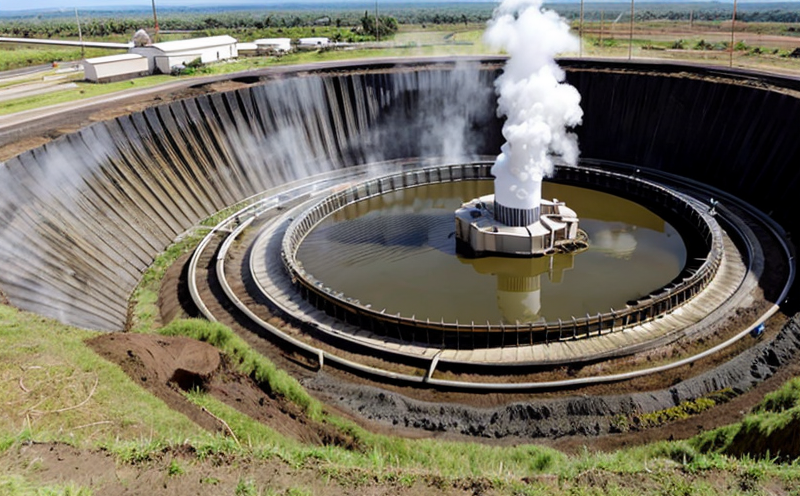Geothermal plant well inspection
The integrity of geothermal wells is crucial for ensuring efficient and sustainable energy extraction. In geothermal systems, heat from the Earth's interior is harnessed to generate electricity or provide heating and cooling services. To maintain optimal performance, regular inspections are necessary to identify potential issues such as corrosion, scaling, and structural damage that can compromise well integrity.
These inspections go beyond mere visual checks; they require a comprehensive approach using advanced technologies and methodologies. The aim is not only to assess the current state of the well but also to predict future degradation and recommend preventive measures. Understanding the specific requirements for geothermal plants helps in tailoring inspection protocols that align with international standards, ensuring compliance while enhancing safety and operational efficiency.
The importance of such inspections cannot be overstated. A single compromised well can lead to significant financial losses due to downtime, increased maintenance costs, and potential environmental risks if fluids or gases escape into the surrounding environment. By adhering to strict protocols and leveraging cutting-edge technology, geothermal plant operators can minimize these risks.
International standards like ISO 15972:2004 for pipeline integrity management provide a framework that aligns with best practices in well inspection. This standard emphasizes non-destructive testing (NDT) techniques such as ultrasonic testing and magnetic flux leakage to evaluate the internal condition of pipes without causing damage.
In summary, geothermal plant well inspections are vital for maintaining the health and longevity of these critical energy systems. By adopting rigorous inspection procedures based on recognized international guidelines, operators can ensure reliable operation, extend asset life, and reduce operational risks.
Why It Matters
The integrity of geothermal wells is not just a matter of efficiency; it's also about sustainability and safety. Regular inspections help in identifying early signs of degradation, which can prevent costly repairs or replacements. For quality managers and compliance officers, ensuring adherence to international standards like ISO 15972:2004 is essential for maintaining regulatory compliance.
From an R&D perspective, understanding the unique challenges faced by geothermal systems allows for the development of more robust inspection methods. This research can lead to innovations that improve detection accuracy and reduce maintenance intervals, thereby enhancing overall performance. In procurement, selecting appropriate testing equipment and materials based on these inspections ensures that the right tools are used for the job.
The impact of well integrity extends beyond operational efficiency; it also has environmental implications. By minimizing leaks or escapes of geothermal fluids into the environment, operators can reduce their carbon footprint and comply with environmental regulations. This aligns with broader sustainability goals within the energy sector.
Scope and Methodology
| Aspect | Description |
|---|---|
| Data Collection | Includes historical records, operational data, and previous inspection reports. |
| Visual Inspection | Checks for visible signs of damage or wear on the well casing and surrounding area. |
| Non-Destructive Testing (NDT) | Uses ultrasonic testing and magnetic flux leakage to assess internal pipe conditions. |
| Fluid Sampling | Gathers samples for analysis of chemical composition, temperature, and pressure levels. |
| Acoustic Emission Monitoring | Monitors sound waves generated by stress in the well structure to detect potential fractures. |
| Pressure Testing | Performs tests to determine the structural integrity under pressure. |
| Step | Description |
|---|---|
| Data Compilation | Gathers all collected data into a single comprehensive report. |
| Analytical Review | Evaluates the data against established benchmarks to identify anomalies. |
| Recommendations | Provides actionable insights based on findings, including maintenance schedules and repair recommendations. |
| Reporting | Presents the analysis in a clear format suitable for stakeholders. |
| Auditing | Ensures compliance with relevant international standards like ISO 15972:2004. |
The methodology employed during geothermal plant well inspections ensures that all critical aspects are thoroughly examined. This comprehensive approach guarantees accurate assessment and informed decision-making, contributing to the long-term sustainability of these energy systems.
International Acceptance and Recognition
The global recognition of ISO 15972:2004 as a benchmark for pipeline integrity management underscores its importance in geothermal plant well inspections. Compliance with this standard is not only a requirement but also a commitment to excellence in the field.
International acceptance extends beyond just adherence to standards; it includes collaboration and exchange of best practices among countries. This collaborative effort fosters innovation and ensures that all stakeholders are working towards common goals of efficiency, safety, and sustainability.
The implementation of these international standards in geothermal plant well inspections demonstrates a commitment to high-quality testing and analysis. It also highlights the importance of continuous improvement and adaptation to new technologies and methodologies.





